LWS101 Ethics, Law, and Healthcare: A Blood Transfusion Case Study
VerifiedAdded on 2023/01/05
|10
|1936
|75
Case Study
AI Summary
This case study examines a complex scenario involving a patient, Valentina Dawson, who requires a blood transfusion after childbirth but is unconscious and a Jehovah's Witness, opposing blood products. The case explores the ethical dilemmas faced by RN Kamal Singh, including respecting patient autonomy versus saving her life, and confidentiality concerns regarding informing the patient's estranged sister. It analyzes relevant ethical principles (autonomy, beneficence, non-maleficence, justice) and legal principles (consent, negligence, presumption of capacity) within the context of the ICN Code of Ethics for Nurses and the Code of Conduct for Nurses 2017. The study considers options for action, such as obtaining consent from family and seeking support, and assesses the potential legal and ethical consequences of different decisions, particularly regarding breach of consent, confidentiality, and negligence. The case highlights the challenges of balancing patient wishes, legal requirements, and ethical obligations in healthcare practice.
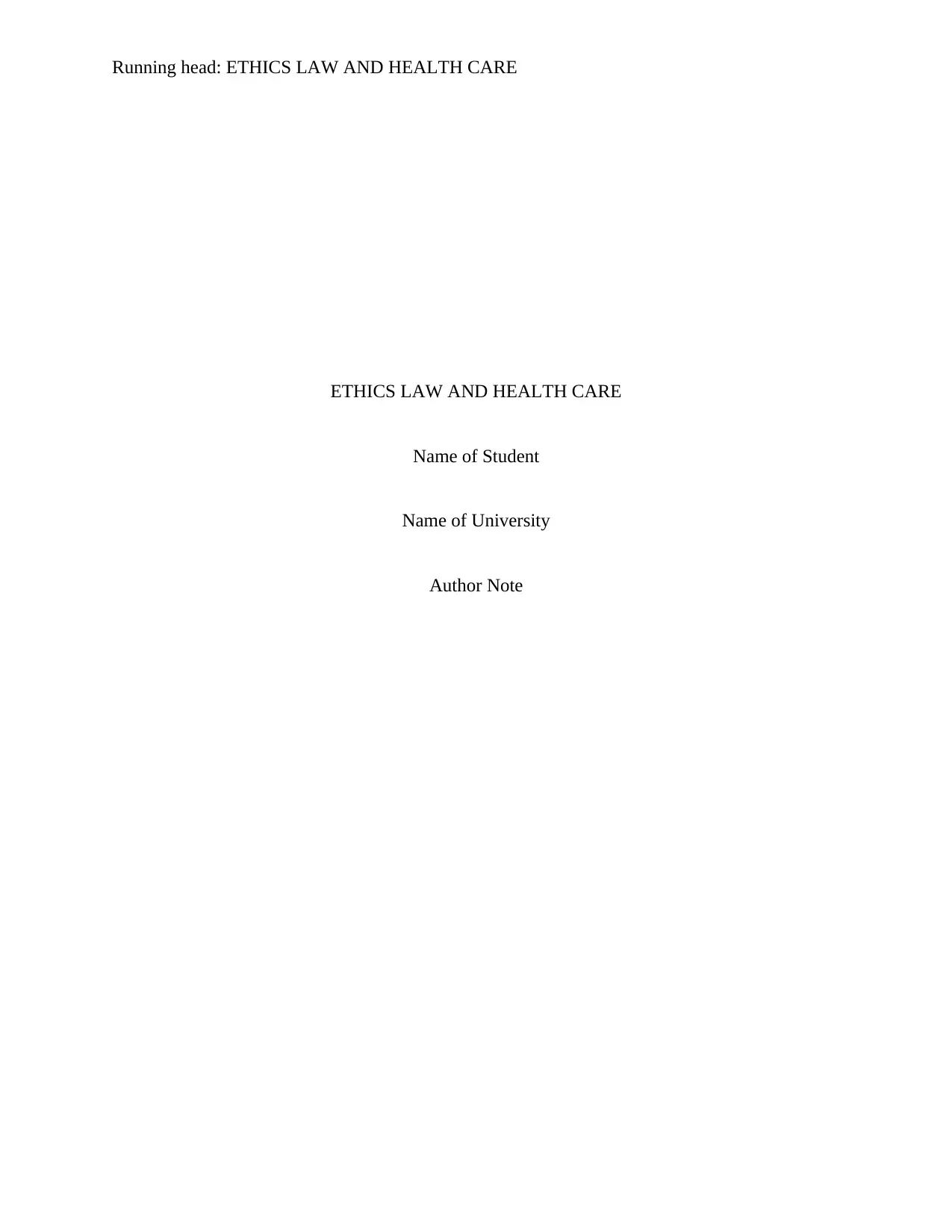
Running head: ETHICS LAW AND HEALTH CARE
ETHICS LAW AND HEALTH CARE
Name of Student
Name of University
Author Note
ETHICS LAW AND HEALTH CARE
Name of Student
Name of University
Author Note
Paraphrase This Document
Need a fresh take? Get an instant paraphrase of this document with our AI Paraphraser
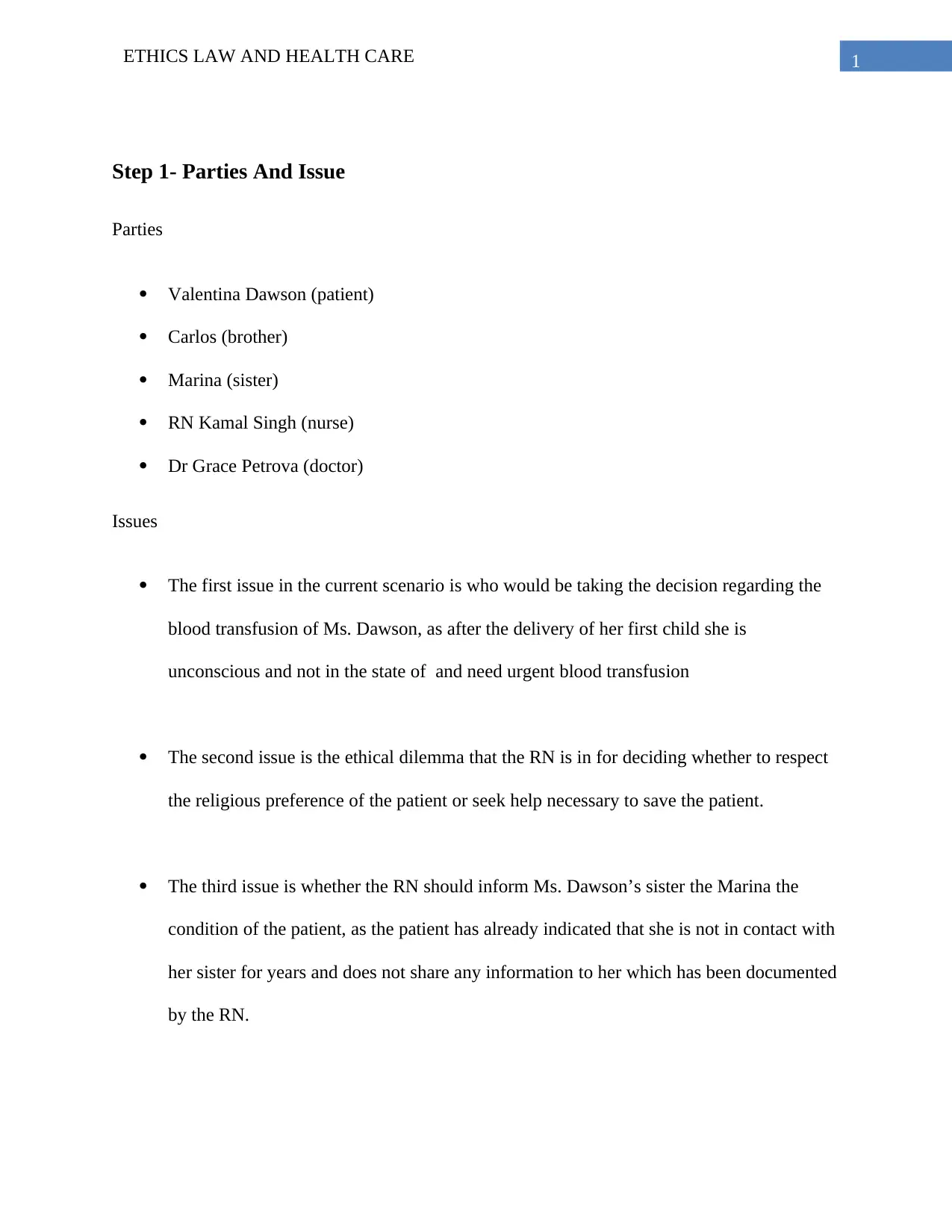
1ETHICS LAW AND HEALTH CARE
Step 1- Parties And Issue
Parties
Valentina Dawson (patient)
Carlos (brother)
Marina (sister)
RN Kamal Singh (nurse)
Dr Grace Petrova (doctor)
Issues
The first issue in the current scenario is who would be taking the decision regarding the
blood transfusion of Ms. Dawson, as after the delivery of her first child she is
unconscious and not in the state of and need urgent blood transfusion
The second issue is the ethical dilemma that the RN is in for deciding whether to respect
the religious preference of the patient or seek help necessary to save the patient.
The third issue is whether the RN should inform Ms. Dawson’s sister the Marina the
condition of the patient, as the patient has already indicated that she is not in contact with
her sister for years and does not share any information to her which has been documented
by the RN.
Step 1- Parties And Issue
Parties
Valentina Dawson (patient)
Carlos (brother)
Marina (sister)
RN Kamal Singh (nurse)
Dr Grace Petrova (doctor)
Issues
The first issue in the current scenario is who would be taking the decision regarding the
blood transfusion of Ms. Dawson, as after the delivery of her first child she is
unconscious and not in the state of and need urgent blood transfusion
The second issue is the ethical dilemma that the RN is in for deciding whether to respect
the religious preference of the patient or seek help necessary to save the patient.
The third issue is whether the RN should inform Ms. Dawson’s sister the Marina the
condition of the patient, as the patient has already indicated that she is not in contact with
her sister for years and does not share any information to her which has been documented
by the RN.
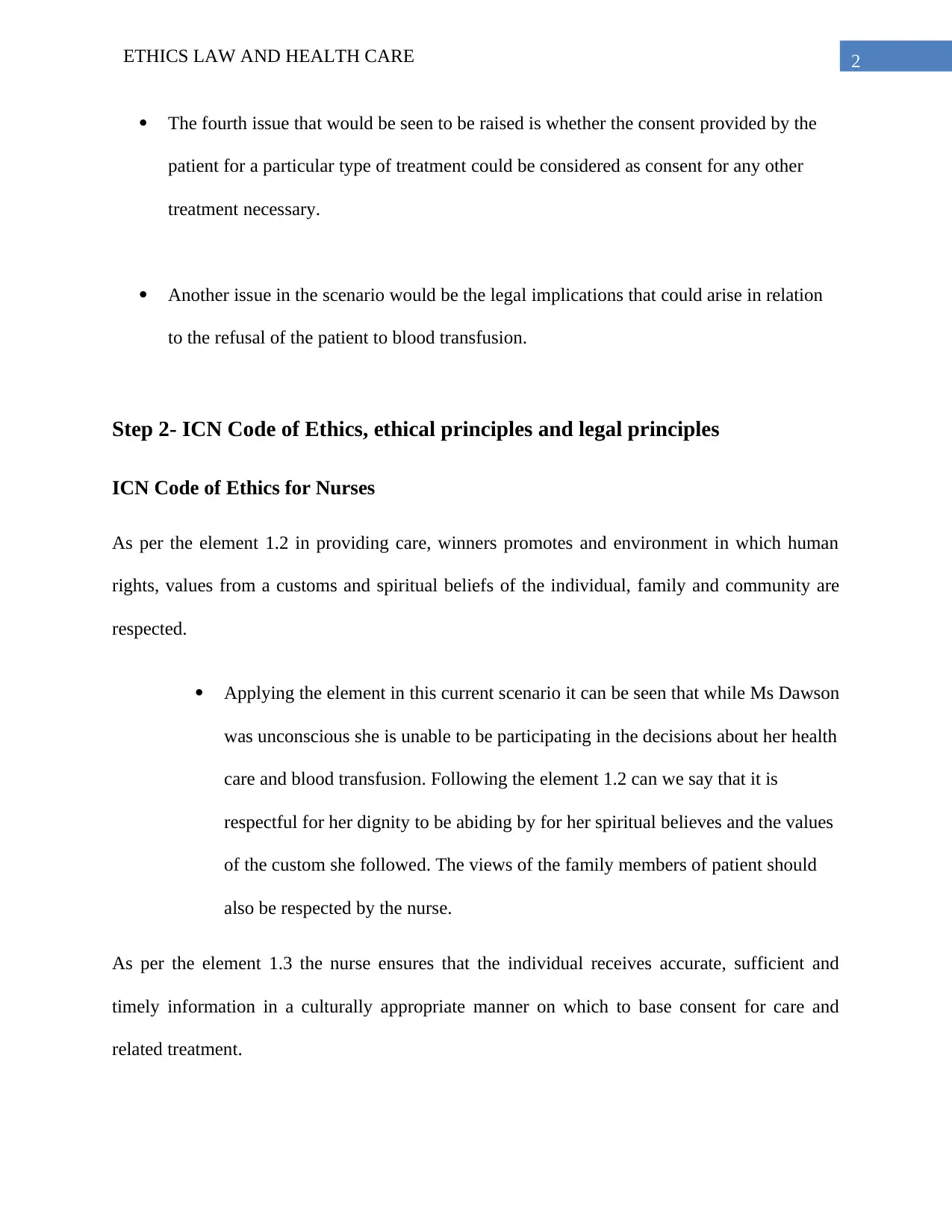
2ETHICS LAW AND HEALTH CARE
The fourth issue that would be seen to be raised is whether the consent provided by the
patient for a particular type of treatment could be considered as consent for any other
treatment necessary.
Another issue in the scenario would be the legal implications that could arise in relation
to the refusal of the patient to blood transfusion.
Step 2- ICN Code of Ethics, ethical principles and legal principles
ICN Code of Ethics for Nurses
As per the element 1.2 in providing care, winners promotes and environment in which human
rights, values from a customs and spiritual beliefs of the individual, family and community are
respected.
Applying the element in this current scenario it can be seen that while Ms Dawson
was unconscious she is unable to be participating in the decisions about her health
care and blood transfusion. Following the element 1.2 can we say that it is
respectful for her dignity to be abiding by for her spiritual believes and the values
of the custom she followed. The views of the family members of patient should
also be respected by the nurse.
As per the element 1.3 the nurse ensures that the individual receives accurate, sufficient and
timely information in a culturally appropriate manner on which to base consent for care and
related treatment.
The fourth issue that would be seen to be raised is whether the consent provided by the
patient for a particular type of treatment could be considered as consent for any other
treatment necessary.
Another issue in the scenario would be the legal implications that could arise in relation
to the refusal of the patient to blood transfusion.
Step 2- ICN Code of Ethics, ethical principles and legal principles
ICN Code of Ethics for Nurses
As per the element 1.2 in providing care, winners promotes and environment in which human
rights, values from a customs and spiritual beliefs of the individual, family and community are
respected.
Applying the element in this current scenario it can be seen that while Ms Dawson
was unconscious she is unable to be participating in the decisions about her health
care and blood transfusion. Following the element 1.2 can we say that it is
respectful for her dignity to be abiding by for her spiritual believes and the values
of the custom she followed. The views of the family members of patient should
also be respected by the nurse.
As per the element 1.3 the nurse ensures that the individual receives accurate, sufficient and
timely information in a culturally appropriate manner on which to base consent for care and
related treatment.
⊘ This is a preview!⊘
Do you want full access?
Subscribe today to unlock all pages.

Trusted by 1+ million students worldwide
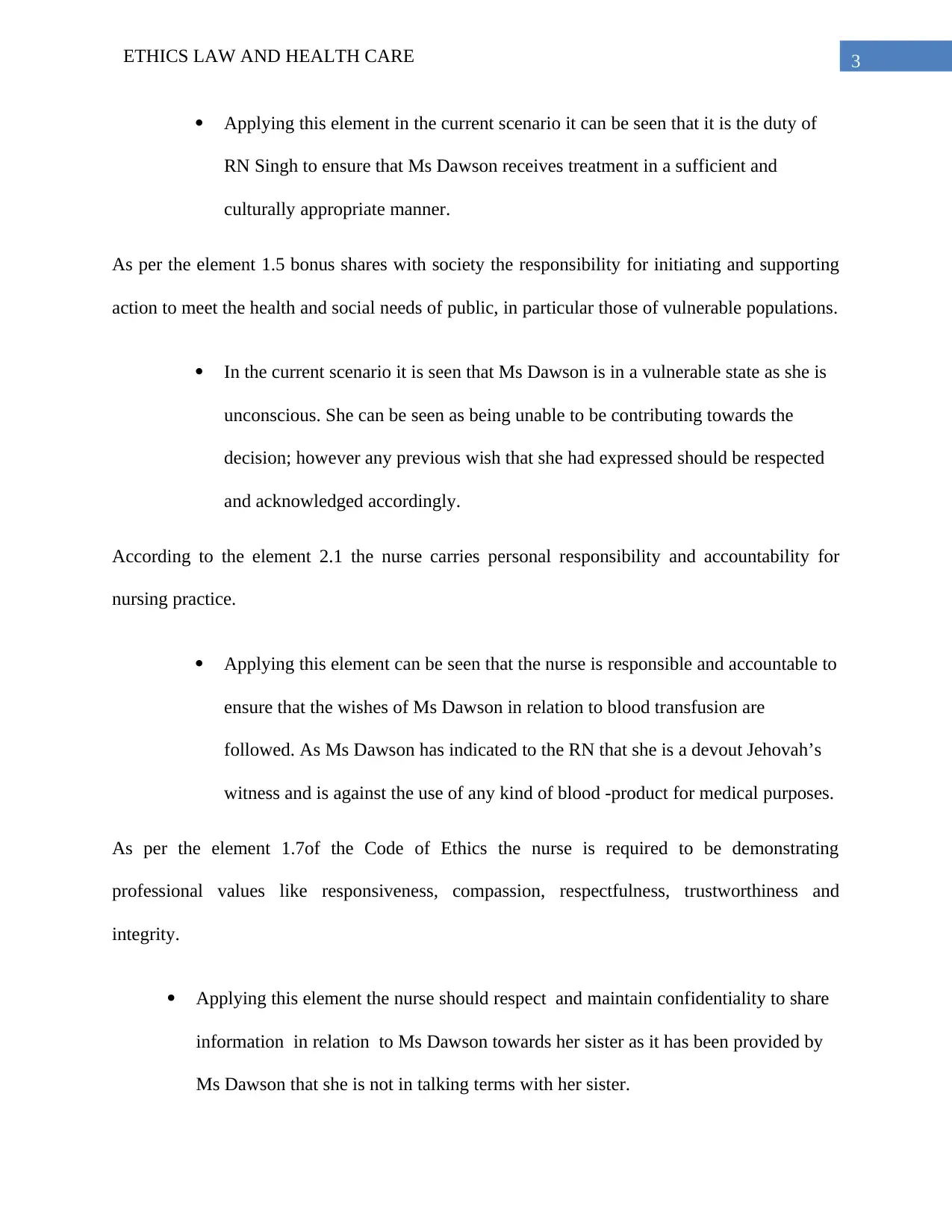
3ETHICS LAW AND HEALTH CARE
Applying this element in the current scenario it can be seen that it is the duty of
RN Singh to ensure that Ms Dawson receives treatment in a sufficient and
culturally appropriate manner.
As per the element 1.5 bonus shares with society the responsibility for initiating and supporting
action to meet the health and social needs of public, in particular those of vulnerable populations.
In the current scenario it is seen that Ms Dawson is in a vulnerable state as she is
unconscious. She can be seen as being unable to be contributing towards the
decision; however any previous wish that she had expressed should be respected
and acknowledged accordingly.
According to the element 2.1 the nurse carries personal responsibility and accountability for
nursing practice.
Applying this element can be seen that the nurse is responsible and accountable to
ensure that the wishes of Ms Dawson in relation to blood transfusion are
followed. As Ms Dawson has indicated to the RN that she is a devout Jehovah’s
witness and is against the use of any kind of blood -product for medical purposes.
As per the element 1.7of the Code of Ethics the nurse is required to be demonstrating
professional values like responsiveness, compassion, respectfulness, trustworthiness and
integrity.
Applying this element the nurse should respect and maintain confidentiality to share
information in relation to Ms Dawson towards her sister as it has been provided by
Ms Dawson that she is not in talking terms with her sister.
Applying this element in the current scenario it can be seen that it is the duty of
RN Singh to ensure that Ms Dawson receives treatment in a sufficient and
culturally appropriate manner.
As per the element 1.5 bonus shares with society the responsibility for initiating and supporting
action to meet the health and social needs of public, in particular those of vulnerable populations.
In the current scenario it is seen that Ms Dawson is in a vulnerable state as she is
unconscious. She can be seen as being unable to be contributing towards the
decision; however any previous wish that she had expressed should be respected
and acknowledged accordingly.
According to the element 2.1 the nurse carries personal responsibility and accountability for
nursing practice.
Applying this element can be seen that the nurse is responsible and accountable to
ensure that the wishes of Ms Dawson in relation to blood transfusion are
followed. As Ms Dawson has indicated to the RN that she is a devout Jehovah’s
witness and is against the use of any kind of blood -product for medical purposes.
As per the element 1.7of the Code of Ethics the nurse is required to be demonstrating
professional values like responsiveness, compassion, respectfulness, trustworthiness and
integrity.
Applying this element the nurse should respect and maintain confidentiality to share
information in relation to Ms Dawson towards her sister as it has been provided by
Ms Dawson that she is not in talking terms with her sister.
Paraphrase This Document
Need a fresh take? Get an instant paraphrase of this document with our AI Paraphraser
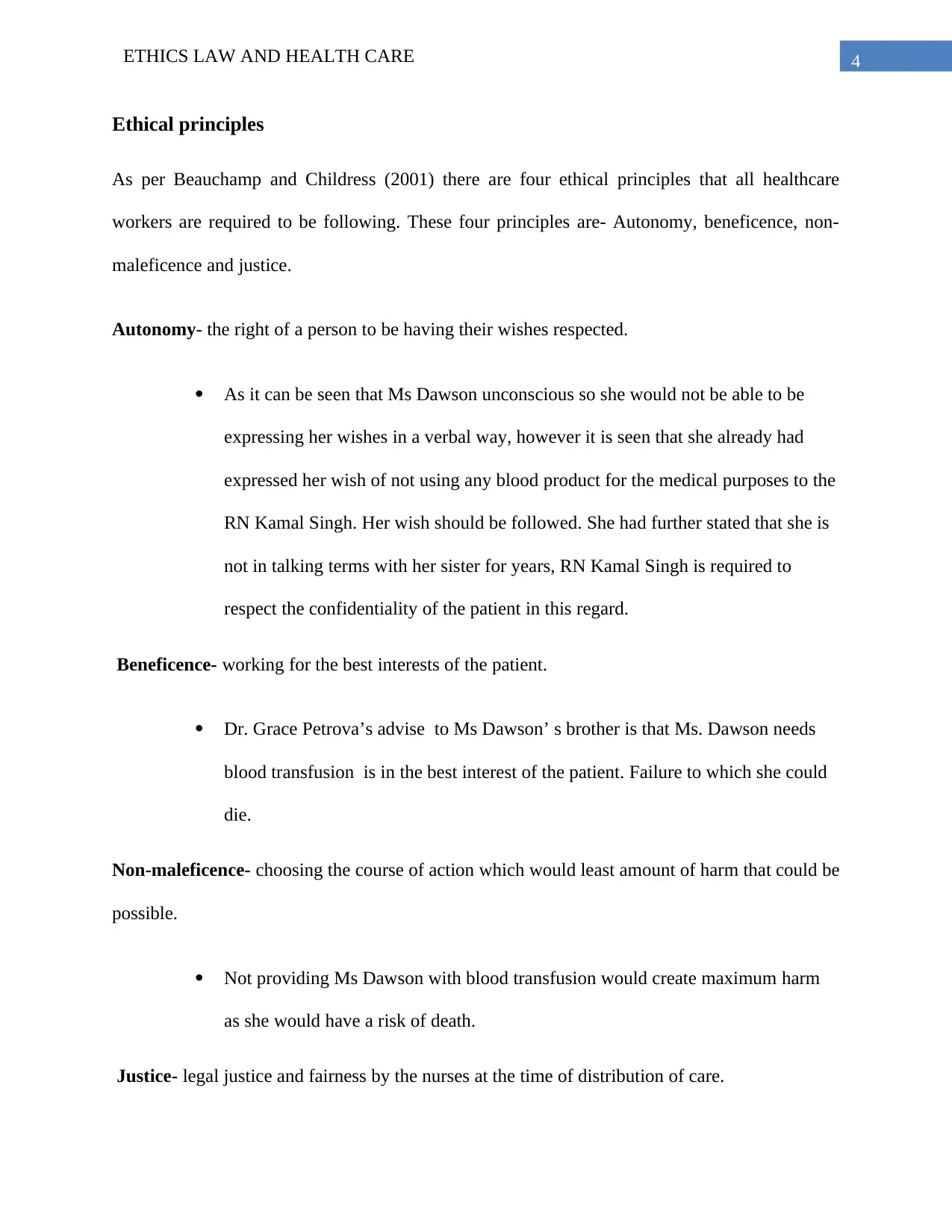
4ETHICS LAW AND HEALTH CARE
Ethical principles
As per Beauchamp and Childress (2001) there are four ethical principles that all healthcare
workers are required to be following. These four principles are- Autonomy, beneficence, non-
maleficence and justice.
Autonomy- the right of a person to be having their wishes respected.
As it can be seen that Ms Dawson unconscious so she would not be able to be
expressing her wishes in a verbal way, however it is seen that she already had
expressed her wish of not using any blood product for the medical purposes to the
RN Kamal Singh. Her wish should be followed. She had further stated that she is
not in talking terms with her sister for years, RN Kamal Singh is required to
respect the confidentiality of the patient in this regard.
Beneficence- working for the best interests of the patient.
Dr. Grace Petrova’s advise to Ms Dawson’ s brother is that Ms. Dawson needs
blood transfusion is in the best interest of the patient. Failure to which she could
die.
Non-maleficence- choosing the course of action which would least amount of harm that could be
possible.
Not providing Ms Dawson with blood transfusion would create maximum harm
as she would have a risk of death.
Justice- legal justice and fairness by the nurses at the time of distribution of care.
Ethical principles
As per Beauchamp and Childress (2001) there are four ethical principles that all healthcare
workers are required to be following. These four principles are- Autonomy, beneficence, non-
maleficence and justice.
Autonomy- the right of a person to be having their wishes respected.
As it can be seen that Ms Dawson unconscious so she would not be able to be
expressing her wishes in a verbal way, however it is seen that she already had
expressed her wish of not using any blood product for the medical purposes to the
RN Kamal Singh. Her wish should be followed. She had further stated that she is
not in talking terms with her sister for years, RN Kamal Singh is required to
respect the confidentiality of the patient in this regard.
Beneficence- working for the best interests of the patient.
Dr. Grace Petrova’s advise to Ms Dawson’ s brother is that Ms. Dawson needs
blood transfusion is in the best interest of the patient. Failure to which she could
die.
Non-maleficence- choosing the course of action which would least amount of harm that could be
possible.
Not providing Ms Dawson with blood transfusion would create maximum harm
as she would have a risk of death.
Justice- legal justice and fairness by the nurses at the time of distribution of care.
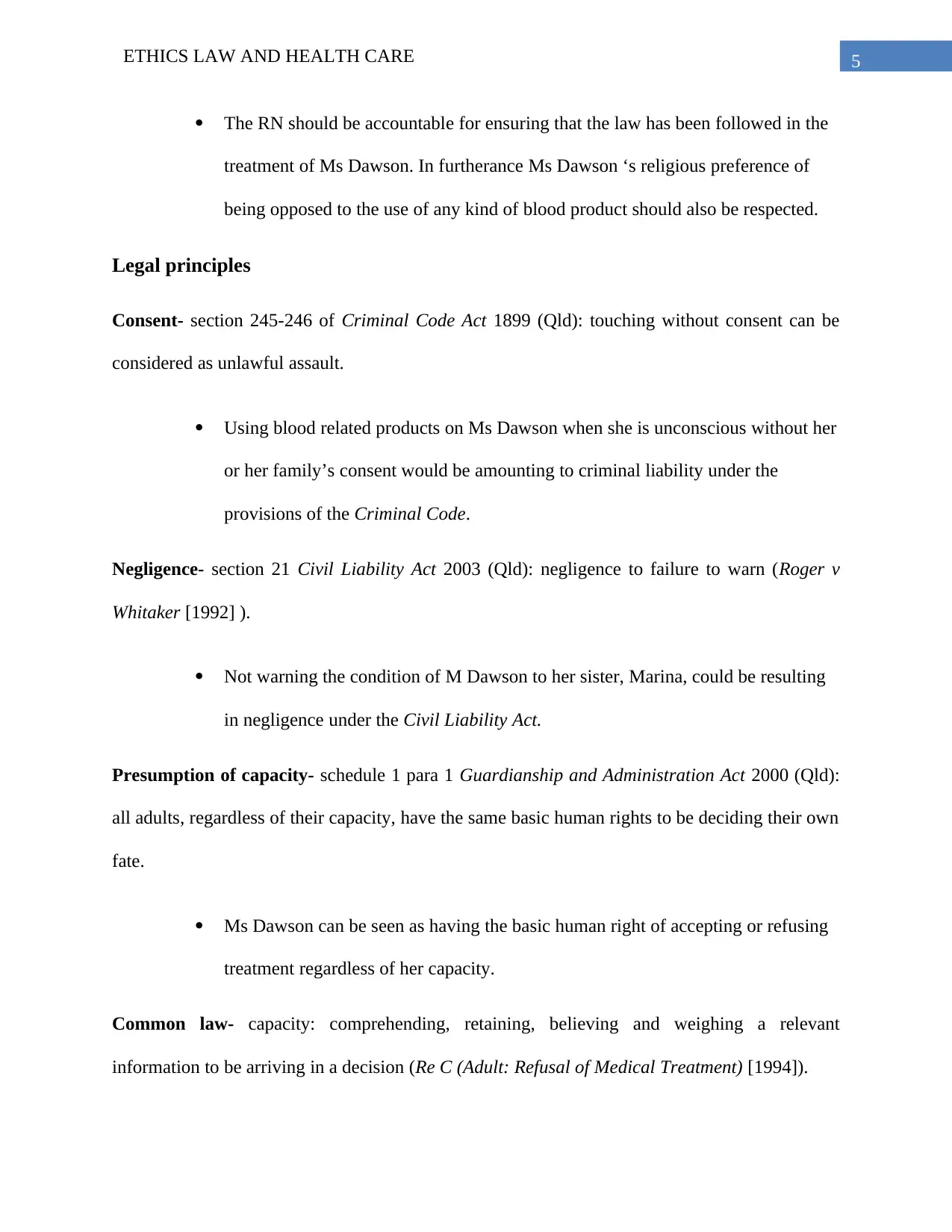
5ETHICS LAW AND HEALTH CARE
The RN should be accountable for ensuring that the law has been followed in the
treatment of Ms Dawson. In furtherance Ms Dawson ‘s religious preference of
being opposed to the use of any kind of blood product should also be respected.
Legal principles
Consent- section 245-246 of Criminal Code Act 1899 (Qld): touching without consent can be
considered as unlawful assault.
Using blood related products on Ms Dawson when she is unconscious without her
or her family’s consent would be amounting to criminal liability under the
provisions of the Criminal Code.
Negligence- section 21 Civil Liability Act 2003 (Qld): negligence to failure to warn (Roger v
Whitaker [1992] ).
Not warning the condition of M Dawson to her sister, Marina, could be resulting
in negligence under the Civil Liability Act.
Presumption of capacity- schedule 1 para 1 Guardianship and Administration Act 2000 (Qld):
all adults, regardless of their capacity, have the same basic human rights to be deciding their own
fate.
Ms Dawson can be seen as having the basic human right of accepting or refusing
treatment regardless of her capacity.
Common law- capacity: comprehending, retaining, believing and weighing a relevant
information to be arriving in a decision (Re C (Adult: Refusal of Medical Treatment) [1994]).
The RN should be accountable for ensuring that the law has been followed in the
treatment of Ms Dawson. In furtherance Ms Dawson ‘s religious preference of
being opposed to the use of any kind of blood product should also be respected.
Legal principles
Consent- section 245-246 of Criminal Code Act 1899 (Qld): touching without consent can be
considered as unlawful assault.
Using blood related products on Ms Dawson when she is unconscious without her
or her family’s consent would be amounting to criminal liability under the
provisions of the Criminal Code.
Negligence- section 21 Civil Liability Act 2003 (Qld): negligence to failure to warn (Roger v
Whitaker [1992] ).
Not warning the condition of M Dawson to her sister, Marina, could be resulting
in negligence under the Civil Liability Act.
Presumption of capacity- schedule 1 para 1 Guardianship and Administration Act 2000 (Qld):
all adults, regardless of their capacity, have the same basic human rights to be deciding their own
fate.
Ms Dawson can be seen as having the basic human right of accepting or refusing
treatment regardless of her capacity.
Common law- capacity: comprehending, retaining, believing and weighing a relevant
information to be arriving in a decision (Re C (Adult: Refusal of Medical Treatment) [1994]).
⊘ This is a preview!⊘
Do you want full access?
Subscribe today to unlock all pages.

Trusted by 1+ million students worldwide
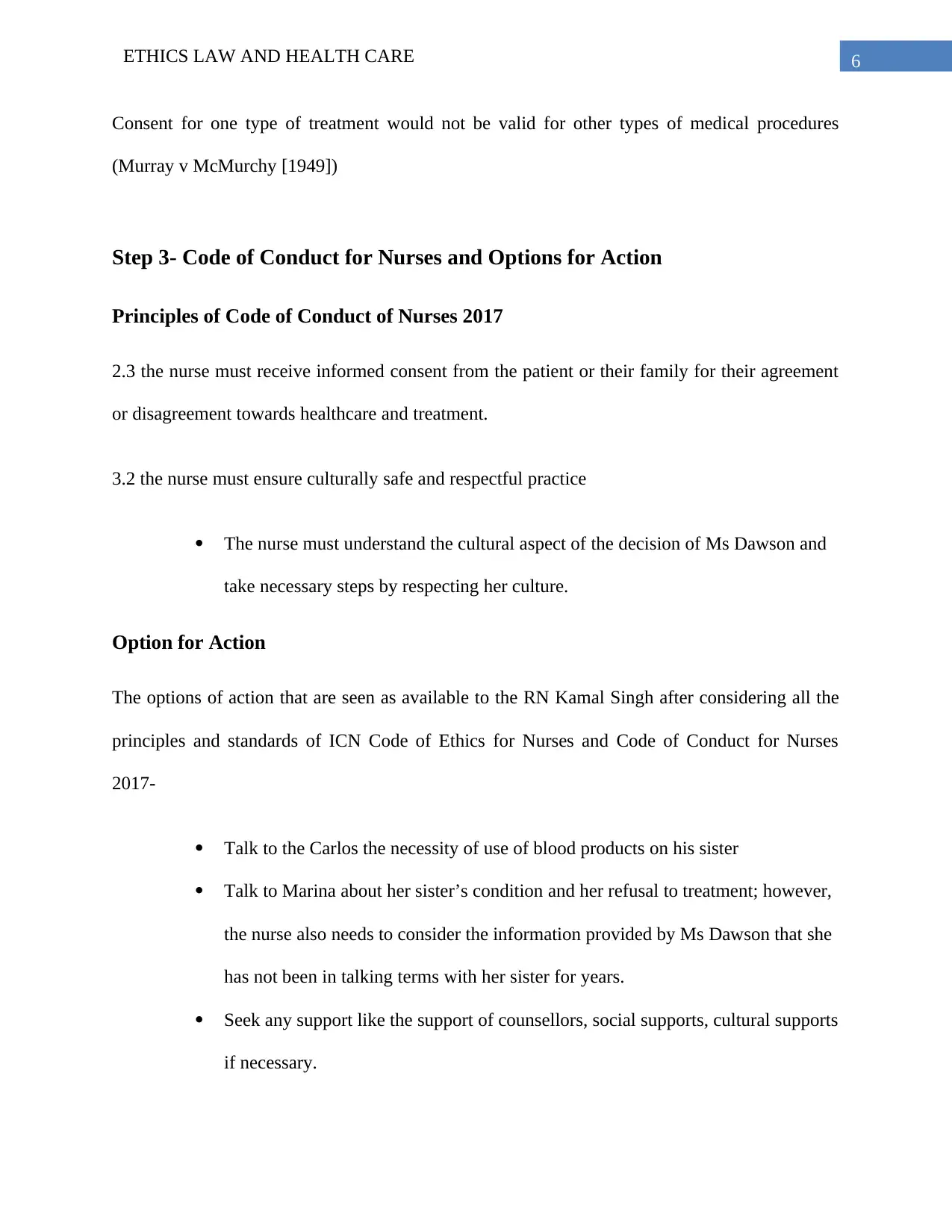
6ETHICS LAW AND HEALTH CARE
Consent for one type of treatment would not be valid for other types of medical procedures
(Murray v McMurchy [1949])
Step 3- Code of Conduct for Nurses and Options for Action
Principles of Code of Conduct of Nurses 2017
2.3 the nurse must receive informed consent from the patient or their family for their agreement
or disagreement towards healthcare and treatment.
3.2 the nurse must ensure culturally safe and respectful practice
The nurse must understand the cultural aspect of the decision of Ms Dawson and
take necessary steps by respecting her culture.
Option for Action
The options of action that are seen as available to the RN Kamal Singh after considering all the
principles and standards of ICN Code of Ethics for Nurses and Code of Conduct for Nurses
2017-
Talk to the Carlos the necessity of use of blood products on his sister
Talk to Marina about her sister’s condition and her refusal to treatment; however,
the nurse also needs to consider the information provided by Ms Dawson that she
has not been in talking terms with her sister for years.
Seek any support like the support of counsellors, social supports, cultural supports
if necessary.
Consent for one type of treatment would not be valid for other types of medical procedures
(Murray v McMurchy [1949])
Step 3- Code of Conduct for Nurses and Options for Action
Principles of Code of Conduct of Nurses 2017
2.3 the nurse must receive informed consent from the patient or their family for their agreement
or disagreement towards healthcare and treatment.
3.2 the nurse must ensure culturally safe and respectful practice
The nurse must understand the cultural aspect of the decision of Ms Dawson and
take necessary steps by respecting her culture.
Option for Action
The options of action that are seen as available to the RN Kamal Singh after considering all the
principles and standards of ICN Code of Ethics for Nurses and Code of Conduct for Nurses
2017-
Talk to the Carlos the necessity of use of blood products on his sister
Talk to Marina about her sister’s condition and her refusal to treatment; however,
the nurse also needs to consider the information provided by Ms Dawson that she
has not been in talking terms with her sister for years.
Seek any support like the support of counsellors, social supports, cultural supports
if necessary.
Paraphrase This Document
Need a fresh take? Get an instant paraphrase of this document with our AI Paraphraser
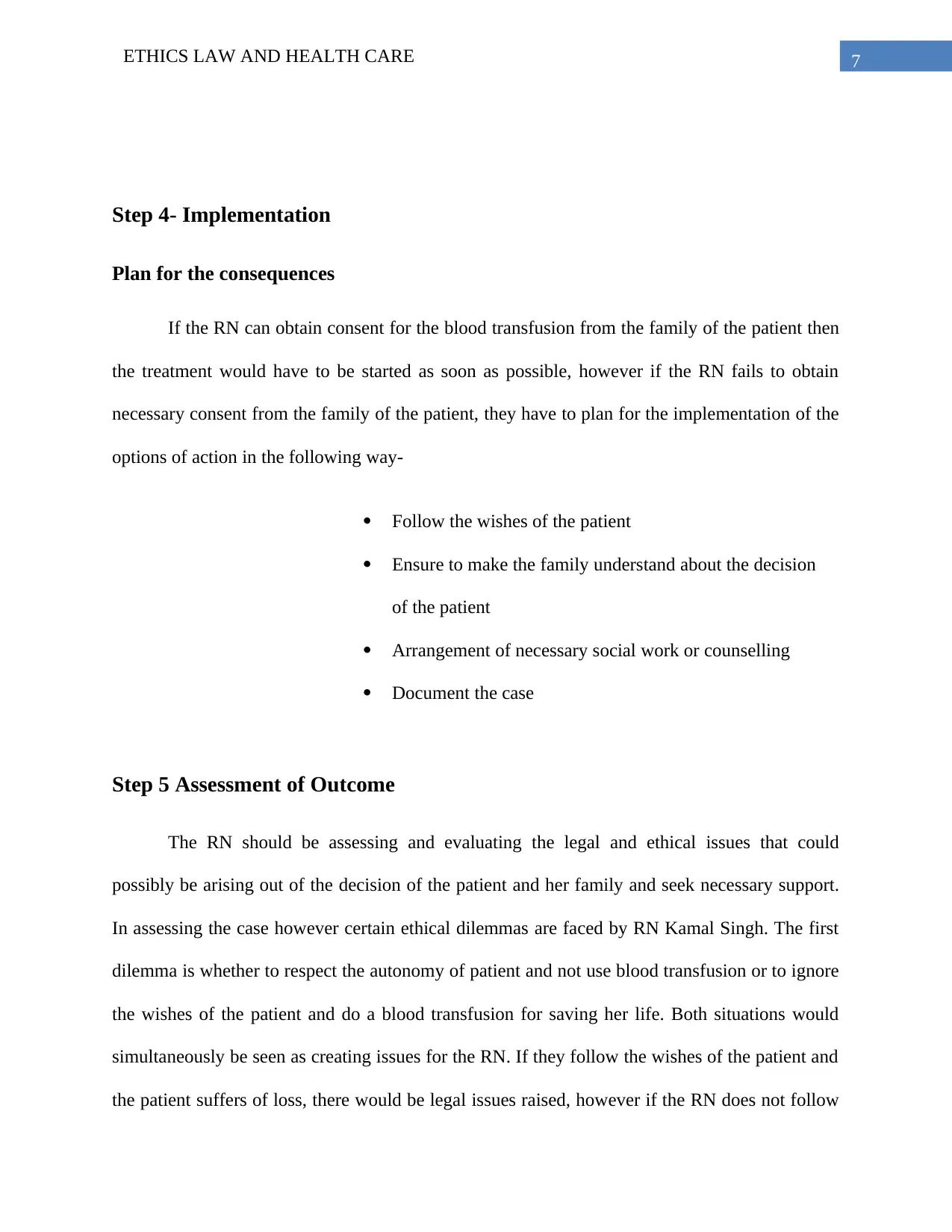
7ETHICS LAW AND HEALTH CARE
Step 4- Implementation
Plan for the consequences
If the RN can obtain consent for the blood transfusion from the family of the patient then
the treatment would have to be started as soon as possible, however if the RN fails to obtain
necessary consent from the family of the patient, they have to plan for the implementation of the
options of action in the following way-
Follow the wishes of the patient
Ensure to make the family understand about the decision
of the patient
Arrangement of necessary social work or counselling
Document the case
Step 5 Assessment of Outcome
The RN should be assessing and evaluating the legal and ethical issues that could
possibly be arising out of the decision of the patient and her family and seek necessary support.
In assessing the case however certain ethical dilemmas are faced by RN Kamal Singh. The first
dilemma is whether to respect the autonomy of patient and not use blood transfusion or to ignore
the wishes of the patient and do a blood transfusion for saving her life. Both situations would
simultaneously be seen as creating issues for the RN. If they follow the wishes of the patient and
the patient suffers of loss, there would be legal issues raised, however if the RN does not follow
Step 4- Implementation
Plan for the consequences
If the RN can obtain consent for the blood transfusion from the family of the patient then
the treatment would have to be started as soon as possible, however if the RN fails to obtain
necessary consent from the family of the patient, they have to plan for the implementation of the
options of action in the following way-
Follow the wishes of the patient
Ensure to make the family understand about the decision
of the patient
Arrangement of necessary social work or counselling
Document the case
Step 5 Assessment of Outcome
The RN should be assessing and evaluating the legal and ethical issues that could
possibly be arising out of the decision of the patient and her family and seek necessary support.
In assessing the case however certain ethical dilemmas are faced by RN Kamal Singh. The first
dilemma is whether to respect the autonomy of patient and not use blood transfusion or to ignore
the wishes of the patient and do a blood transfusion for saving her life. Both situations would
simultaneously be seen as creating issues for the RN. If they follow the wishes of the patient and
the patient suffers of loss, there would be legal issues raised, however if the RN does not follow
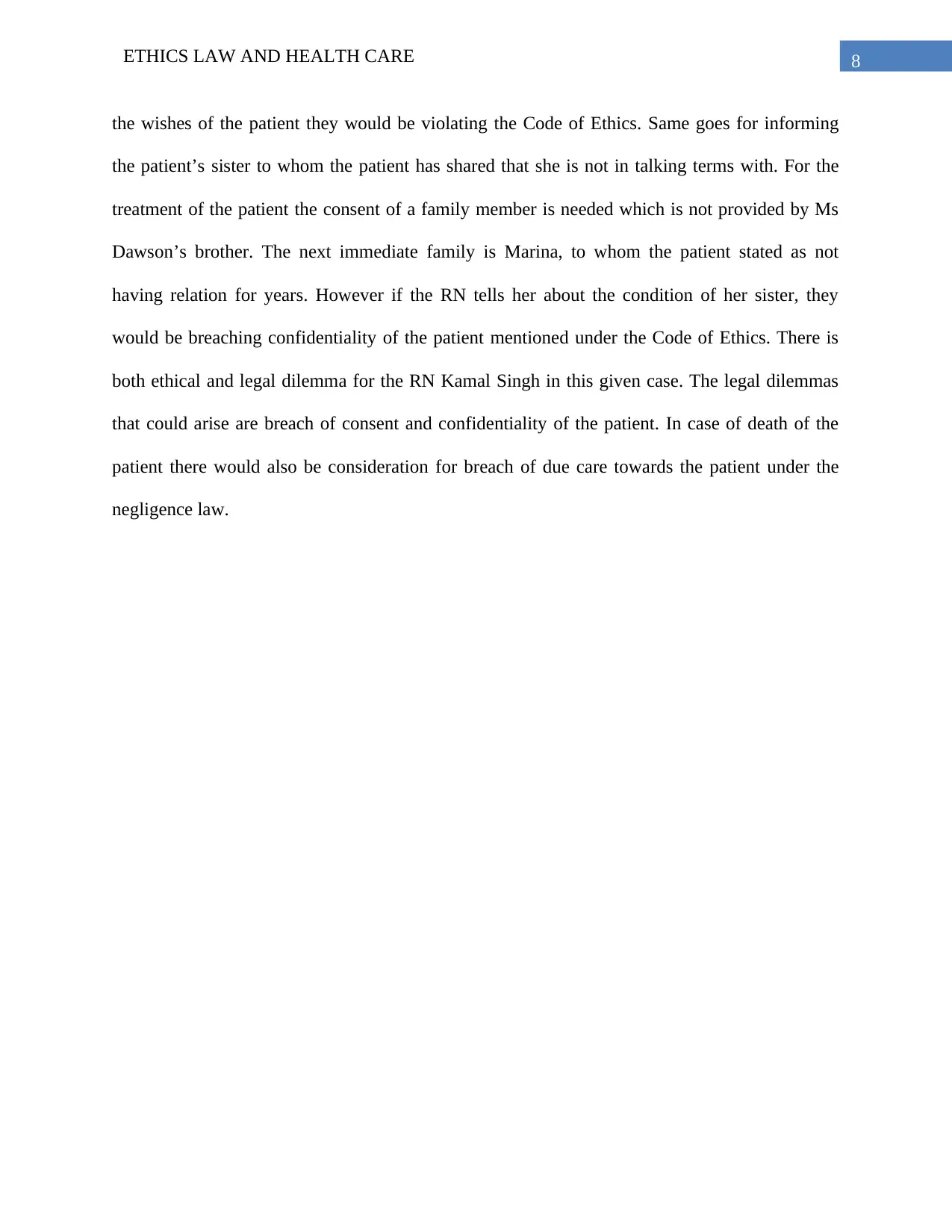
8ETHICS LAW AND HEALTH CARE
the wishes of the patient they would be violating the Code of Ethics. Same goes for informing
the patient’s sister to whom the patient has shared that she is not in talking terms with. For the
treatment of the patient the consent of a family member is needed which is not provided by Ms
Dawson’s brother. The next immediate family is Marina, to whom the patient stated as not
having relation for years. However if the RN tells her about the condition of her sister, they
would be breaching confidentiality of the patient mentioned under the Code of Ethics. There is
both ethical and legal dilemma for the RN Kamal Singh in this given case. The legal dilemmas
that could arise are breach of consent and confidentiality of the patient. In case of death of the
patient there would also be consideration for breach of due care towards the patient under the
negligence law.
the wishes of the patient they would be violating the Code of Ethics. Same goes for informing
the patient’s sister to whom the patient has shared that she is not in talking terms with. For the
treatment of the patient the consent of a family member is needed which is not provided by Ms
Dawson’s brother. The next immediate family is Marina, to whom the patient stated as not
having relation for years. However if the RN tells her about the condition of her sister, they
would be breaching confidentiality of the patient mentioned under the Code of Ethics. There is
both ethical and legal dilemma for the RN Kamal Singh in this given case. The legal dilemmas
that could arise are breach of consent and confidentiality of the patient. In case of death of the
patient there would also be consideration for breach of due care towards the patient under the
negligence law.
⊘ This is a preview!⊘
Do you want full access?
Subscribe today to unlock all pages.

Trusted by 1+ million students worldwide
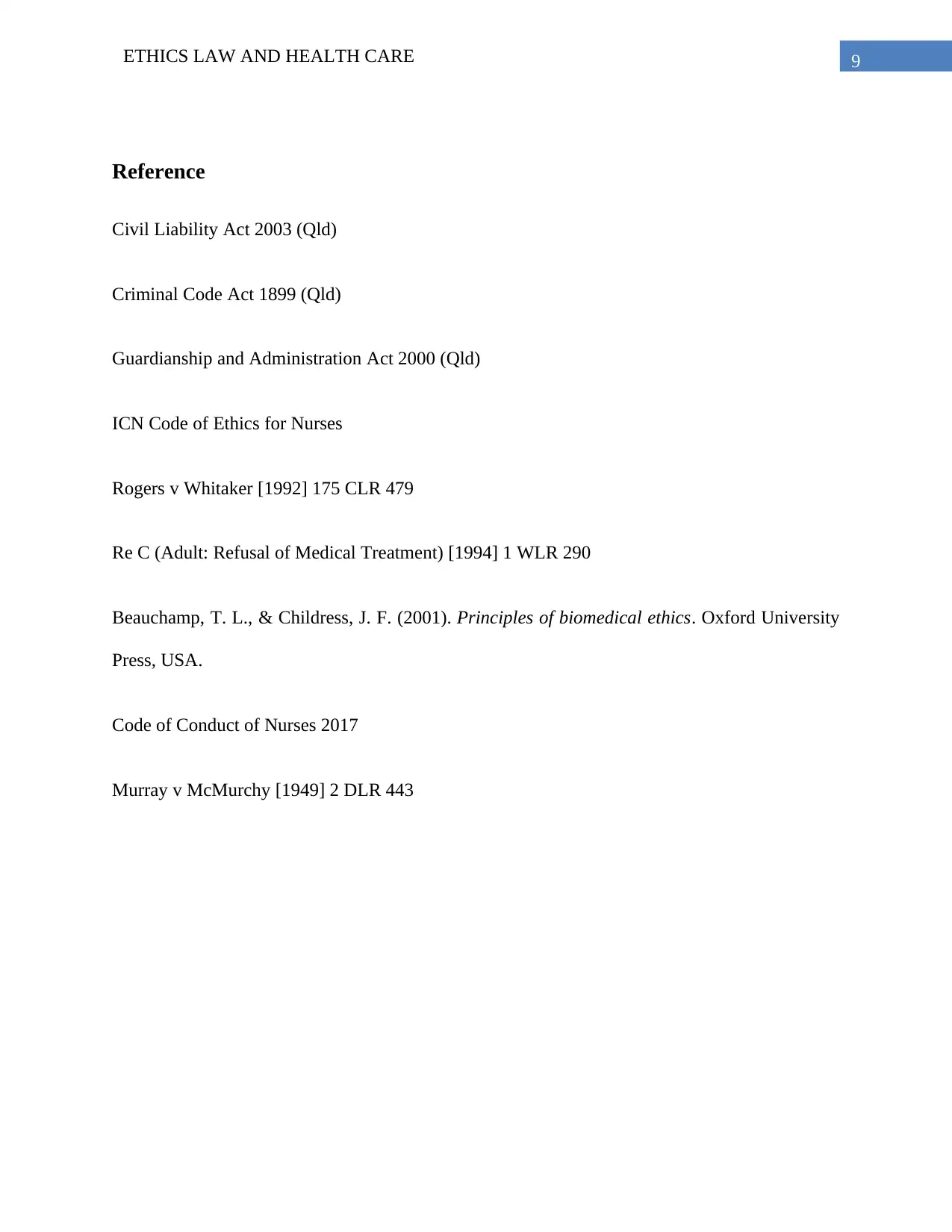
9ETHICS LAW AND HEALTH CARE
Reference
Civil Liability Act 2003 (Qld)
Criminal Code Act 1899 (Qld)
Guardianship and Administration Act 2000 (Qld)
ICN Code of Ethics for Nurses
Rogers v Whitaker [1992] 175 CLR 479
Re C (Adult: Refusal of Medical Treatment) [1994] 1 WLR 290
Beauchamp, T. L., & Childress, J. F. (2001). Principles of biomedical ethics. Oxford University
Press, USA.
Code of Conduct of Nurses 2017
Murray v McMurchy [1949] 2 DLR 443
Reference
Civil Liability Act 2003 (Qld)
Criminal Code Act 1899 (Qld)
Guardianship and Administration Act 2000 (Qld)
ICN Code of Ethics for Nurses
Rogers v Whitaker [1992] 175 CLR 479
Re C (Adult: Refusal of Medical Treatment) [1994] 1 WLR 290
Beauchamp, T. L., & Childress, J. F. (2001). Principles of biomedical ethics. Oxford University
Press, USA.
Code of Conduct of Nurses 2017
Murray v McMurchy [1949] 2 DLR 443
1 out of 10
Related Documents
Your All-in-One AI-Powered Toolkit for Academic Success.
+13062052269
info@desklib.com
Available 24*7 on WhatsApp / Email
![[object Object]](/_next/static/media/star-bottom.7253800d.svg)
Unlock your academic potential
Copyright © 2020–2026 A2Z Services. All Rights Reserved. Developed and managed by ZUCOL.





